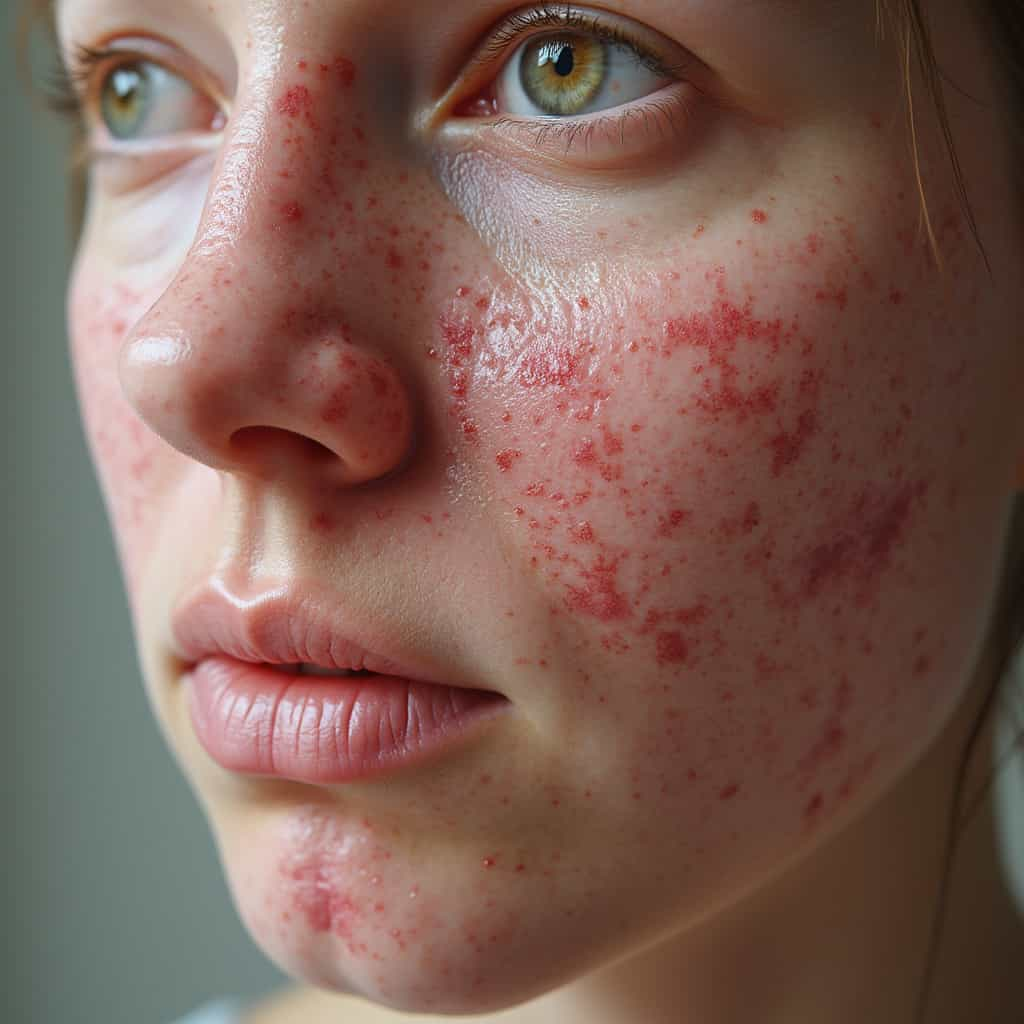Atopic dermatitis, commonly known as eczema, is a chronic inflammatory skin condition that affects people of all ages but is most prevalent in children. Characterized by itchy, inflamed skin patches, it is known for its cyclical nature, with periods of flare-ups and remission. Symptoms often vary depending on age, with infants showing rashes on the scalp and face, while older children and adults usually experience it on the elbows, knees, and hands.
Psoriasis, although a separate condition, presents with some overlapping features such as red, scaly skin. Both conditions are autoimmune in nature, and while psoriasis affects about 2-3% of the global population, atopic dermatitis has a variable incidence, affecting up to 20% of children and 3% of adults, with higher rates in industrialized countries. The distinction between the conditions is critical because their treatments can overlap but are not universally applicable.
The symptoms of atopic dermatitis extend beyond the visible inflammation; individuals often experience intense itching that can disrupt sleep and diminish quality of life. The skin may become dry, thickened, and cracked, leading to secondary infections if left untreated. Psoriasis adds another layer of complexity with its tendency to manifest in areas like the scalp, which can sometimes be mistaken for dandruff or other scalp conditions.
Traditional treatments for atopic dermatitis include moisturizers and topical steroids to reduce inflammation and restore the skin barrier. However, due to potential side effects with lengthy use, alternative options like calcineurin inhibitors are often recommended. These treatments aim to reduce immune response in the skin, thus alleviating symptoms without the risks associated with steroids. Psoriasis treatment may involve similar topical treatments but often includes systemic therapies and biologics, especially in severe cases.
In recent years, the treatment landscape for both atopic dermatitis and psoriasis has seen significant advancements. New biologics, drugs that target specific pathways in the immune system, are being developed to provide relief with reduced side effects. Drugs like dupilumab have shown promise in moderate to severe cases of atopic dermatitis, working by inhibiting certain pathways that contribute to allergic reactions and inflammation.
Researchers have also been examining the microbiome’s role in atopic dermatitis, exploring how bacterial imbalances on the skin may exacerbate symptoms. Trials are underway to determine if probiotic treatments can stabilize such imbalances, potentially offering a novel way to control flare-ups. Similarly, in psoriasis, gut microbiome research is being explored, considering the systemic nature of the disease.
Across various regions, the incidence of atopic dermatitis varies, often influenced by environmental factors and lifestyle. Developed regions report higher rates, possibly due to the ‘hygiene hypothesis,’ suggesting that ultra-clean living environments lower immune system stimulus, leading to allergic diseases like eczema. Furthermore, cities with high pollution levels have observed increased exacerbation of symptoms, linking environmental triggers to chronic skin conditions.
Apart from atopic dermatitis and psoriasis, skin conditions like hair loss, acne, and dental care problems frequently intersect with the dermatological field. Hair loss, often seen alongside stress and autoimmune conditions, can stem from underlying skin issues. Innovative treatments focus on hair follicle health, using growth factors and low-level laser therapy to stimulate regrowth.
Acne, another prevalent condition, is well-known for its impact on mental health, particularly in adolescents. Recent advancements in acne treatment include laser therapies and topical retinoids that normalize skin shedding and reduce blocked pores. Meanwhile, developments in dental care highlight the interconnectedness of oral health with overall wellness, with research advocating for customized care plans to address periodontal diseases that can influence systemic conditions, including those affecting the skin.
The road ahead in dermatological advancements is a promising one. With emerging treatments under clinical trials, including JAK inhibitors and biologics tailored for specific genetic markers, we’re on the brink of a transformative era in skin disease management. These innovative approaches offer hope not only for symptom management but potentially, future cures, changing the narrative for many living with chronic skin conditions.
You may also like
Hair Loss: New studies and experimental treatments
Hair loss is a common issue affecting both men and women globally. This article delves into the various symptoms and treatments available for hair loss and explores new studies and experimental treatments. It also touches upon geographical variations, gender differences, and innovative treatments for related conditions like acne, atopic dermatitis, psoriasis, and dental care.
Acne: Impacts on teenagers and adults
Acne is a common skin condition that affects millions worldwide, with varying impacts on teenagers and adults. This article delves into the symptoms, treatments, and innovative research targeting acne. Additionally, it explores related dermatological issues such as hair loss, atopic dermatitis, psoriasis, and dental care, highlighting the latest advancements in treatment.
Dental Implants and Oral Hygiene: Modern methods and treatment options
This comprehensive article delves into the intricacies of dental implants and oral hygiene, examining modern methods and treatment options. It also explores emerging research on dental implants and discusses issues related to oral hygiene and implantology. Moreover, it provides an overview of symptoms and innovative treatments for conditions like hair loss, atopic dermatitis, psoriasis, and acne.
Implantes Dentários e Higiene Oral: Métodos modernos e opções de tratamento
Este artigo abrangente se aprofunda nas complexidades dos implantes dentários e higiene oral, examinando métodos modernos e opções de tratamento. Ele também explora pesquisas emergentes sobre implantes dentários e discute questões relacionadas à higiene oral e implantologia. Além disso, ele fornece uma visão geral dos sintomas e tratamentos inovadores para condições como perda de cabelo, dermatite atópica, psoríase e acne.
